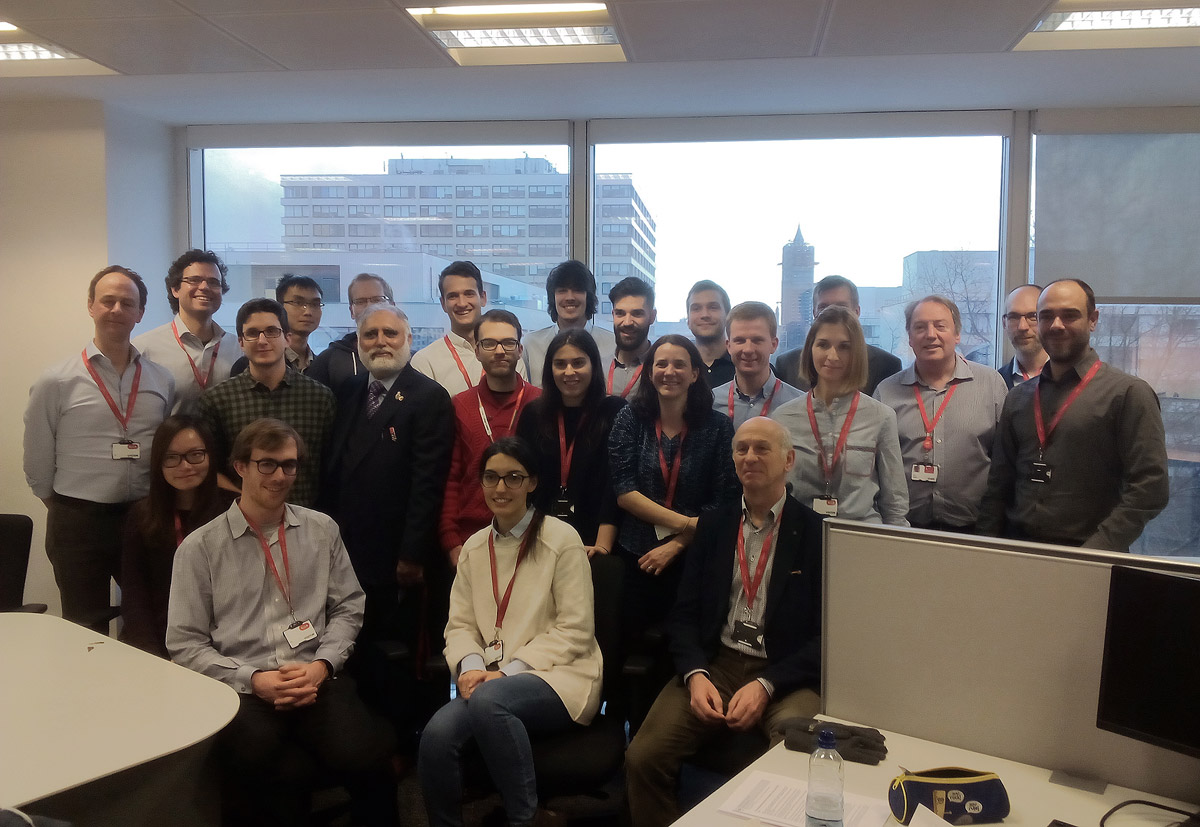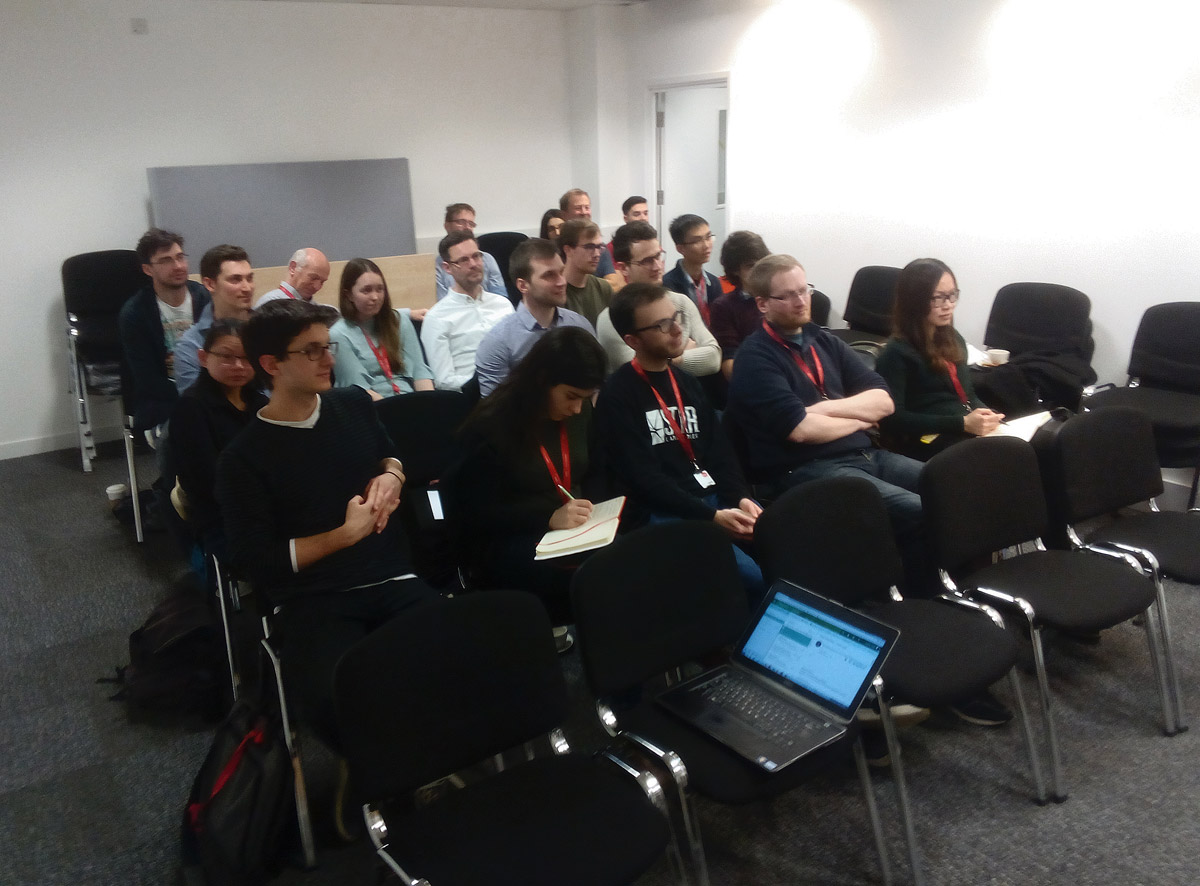PIC Project Kick-Off Meeting
- Date: 28th February to 2nd March 2018
- Venues: 4th Floor of Lambeth Wing, St Thomas Hospital & 5th floor Becket House, 1 Lambeth Palace Road, London, SE1 7EU
- Hosted By PIC Project Coordinator - King's College London (KCL)
Day 1: PIC Project Kick-Off Meeting – 28th February 2018
Just as London experienced a week of winter weather, the PIC Project welcomed the Early Stage Researchers (ESR’s), Beneficiaries/Partners, guest speakers, medical experts, colleagues from the field of Cardiology practice and research. After the arrival and coffee, there was a warm welcome to the PIC Early Stage Researchers (ESR’s) and everyone by Pablo Lamata (PIC Project Leader).
It was a great opportunity for all the ESR’s to meet each other and also for their supervisors from the respective Beneficiaries/Partners in the PIC Project. Each beneficiary and each of the ESR’s introduced themselves formally.

Other meetings and activities included the PIC Project Steering Committee meeting, executive problem solving Games, a very pleasant and useful Networking Dinner, as the heavy snow came down outside.
A key objective to this project Kick-off meeting were the presentation of following Training Modules and Seminars.
Training Modules
There were 4 modules covered in the kick-off meeting:
1. Computational Cardiac Physiology: overview of the physiology and anatomy underlying cardiac function, with details on cellular function, contraction and oxygen delivery, as well as the basic principles in cardiac mechanics and fluid dynamics. Introduction on how to model and simulate these physiological processes in a computer, and the trends in this novel field.
2. Clinical Needs in Cardiology: overview of the diagnosis, treatment and monitoring methodologies in the management of CVD, focusing on the 4 specific clinical problems addressed by PIC: arrhythmias, cardiomyopathies, flow obstructions and heart failure. It introduces a set of techniques of clinical workflow analysis, relevant for understanding clinical needs and define system specifications.
3. Workshop on Inter-Disciplinary Dialogue: the objective is to become aware of the different languages, cultures and interests between different research areas and disciplines, and the skill to build bridges between them.
4. Workshop on Research and Project Management: definition of work plans, time management & literature review; how to write papers and grant proposals; sharing data and results, open Science modus operandi.
Day 1: Training – 28th February
Cardiac Electrophysiology – Esther Pueyo, University of Zaragoza.
Clinical Management of Arrhythmias – Peter Taggart, Guest Presenter, University College, London.
PhD Project Management – Toaha Qureshi, Guest Presenter, FIRD (Forum for International Relations Development).
Day 2: Training – 1st March (Electro-Mechanics)
Modelling Arrhythmias: Insights and Opportunities – Ed Vigmond, University of Bordeaux.
From Deterministic to Population In-silico Studies – Alfonso Bueno, University of Oxford.
HF: Physiology and Clinical Management – Frits Prinzen, University of Maastricht.
Cardiac Mechanics – Espen Remme, Oslo University.
Modelling LBBB and CRT – Steve Niederer, King's College London.
Cardiac Anatomy – Pablo Lamata, King's College London.
Day 3: Training – 2nd March (Flow and Multi-Disciplinary Skills)
Cardiac and Vascular Flow – Parkaj Garg, Guest Presenter, University of Sheffield.
Flow Obstructions: Clinical Management – Ada Doltra, (IDIBAPS).
Modelling Flow Obstructions: Insights and Opportunities – Peter Mortier, FEOPS.
Workshop on Multi-Disciplinary Skills – Annamaria Carusi, Guest Presenter, University of Sheffield.

PIC Early Stage Researchers (ESR’s) at a Training Seminar
First Workshop in Bordeaux
The Bordeaux PIC workshop on “Statistical & mechanistic modelling: mutual synergies in cardiology” was held on 5th-7th November, 2018.
The workshop's goal is to write a review paper on the mechanistic and statistical modelling approaches, and how they can pave the road towards a personalised Cardiology. Mechanistic models capture key aspects of a physical system into a computer model, and statistical models are introducing the revolution of “big data” in healthcare, where we can drive inferences from the experience accumulated in the hospital health records and images.
The workshop will also train PIC researchers' skills on critical thinking (reading, discussion of ideas) and communication and outreach (both to the scientific community or the lay public).
Second Workshop in Canfranc
The Canfranc PIC workshop on “Provision of diagnostic and prognostic value by personalization” was held on 5th-6th March, 2019.
The workshop’s goal is to review mechanistic modelling approaches, and how their personalization can pave the road towards a personalised Cardiology. Mechanistic models represent key aspects of a physical system into a computer model, and can be customised to the specific characteristics of an individual subject/patient. This process provides two main values for the healthcare, diagnostic and prognostic. The diagnosis is driven by the integral and coherent representation of the health status after combining sparse and sometimes contradictory sources of data. The prognostic is provided by either the ability to simulate and predict possible therapy and disease scenarios, or by the statistical inference of the diagnostic markers learned by personalization.
The workshop will thus focus on training PIC researchers’ skills on critical thinking (reading, discussion of ideas), and will also provide a module on research ethics and gender issues.
Third Workshop in Maastricht
The Maastricht PIC workshop on “The Efficient use of Animal and Virtual Models in Evaluation” washeld on 21st-22nd November, 2019.
The workshop's main goal is that fellows get acquainted with the various aspects of animal experiments and experimental models: the benefits and limitations and how they can be used in conjunction with computer models. This will be accomplished by presentations from experts in the field and by discussing assignments by the fellows.
The workshop will be presented by Professor Frits Prinzen from Maastricht University.
Efficient use of Animal and Virtual Models in Translational Cardiovascular Research (PIC Project Workshop)
- November 21st-22nd, 2019.
- The Student Hotel, Maastricht, The Netherlands.
- This is presented by Professor Frits Prinzen from Maastricht University.
ECHO Teens Hub 2019 Launch Event: Science Gallery Visit
- March 16th, 2019.
- Science Gallery, London.
- This was organised by ECHO UK.
https://echo-uk.org/event/echo-teens-hub-2019-launch-event-science-gallery-visit/?mc_cid=e338a0a09b&mc_eid=4c8952d858FIMH 2019
The 10th International Conference on Functional Imaging and Modelling of the Heart
- June 6th-8th, 2019.
- Bordeaux, France.
- This is organised by the Lyric in Bordeaux.
https://fimh2019.sciencesconf.org
Uncertainty Quantification for Cardiac Models
- June 5th-7th, 2019.
- Isaac Newton Institute for Mathematical Sciences in Cambridge, United Kingdom.
- This is organised by Steven Niederer (Kings College London).
- http://www.newton.ac.uk/event/FHTW01
The 4th VPH Summer School
- June 10th-14th, 2019.
- Universitat Pompeu Fabra in Barcelona, Spain.
- This is organised by BCN MedTech.
https://eventum.upf.edu/28646/detail/4th-barcelona-vph-summer-school.html
The Cardiopulmonary Resuscitation (CPR) hands-on Workshop at 4th VPH Summer School
- It is based on the European Resuscitation Committee (ERC) Guidelines.
- June 11th-12th, 2019.
- Universitat Pompeu Fabra in Barcelona, Spain.
- This is organised by Filip Loncaric (ESR/Fellow PIC EU Project) with StEPP (Studentska Ekipa Prve Pomoci).
https://eventum.upf.edu/28646/detail/4th-barcelona-vph-summer-school.html
ICIAM 2019 - International Congress on Industrial and Applied Mathematics
- July 15th-19th, 2019.
- 'Campus de Blasco Ibáñez' of the Universitat de València, in Valencia, Spain.
- This is organised by ICIAM.
- https://iciam2019.org
8th International Workshop on Cardiac Mechano-electrical Coupling and Arrhythmias
BioMedEng19 Conference
MICCAI Conference 2019 Workshop on Smart UltraSound Imaging
Cardiac Physiome 2019